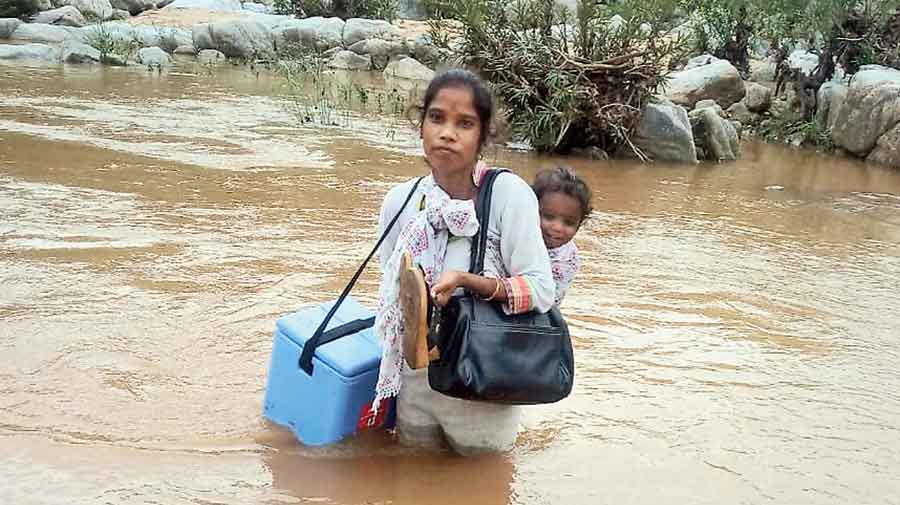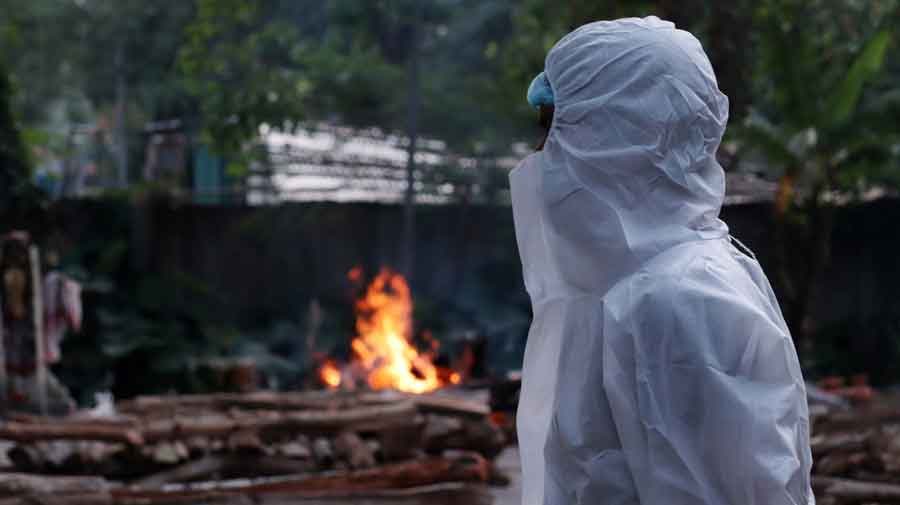A few days every month, a woman in her mid-20s can be seen crossing a nearly waist-deep hilly stream in a Jharkhand forest on foot, her baby tied to her back.
Manti Devi wades the fast-flowing waters of the Burra river with a heavy box of vaccines and a bag full of baby food and other essentials hung over her shoulders, while she holds her chappals in her hand.
It’s hard work for meagre pay that Manti does six days a week, travelling nearly 40km every day through thick jungles, to feed her child and jobless husband. But her work ensures that other families and their children stay safe in the remote forest villages of Latehar district, where medical treatment is hard to access and prevention is key.
Manti, a contractual auxiliary nurse midwife, carries out the government’s regular immunisation programme for young children in the Aksi panchayat, and the Covid vaccination drive at some centres in the Sohar panchayat.
So, she has to travel about 25km every day from her home in Mahuadanr block to the Chetma health centre, to which she is attached, before setting off for forest villages 10-12 km away.
Husband Sunil Oraon, unemployed at the moment, takes her to the health centre and a part of the way to the villages on his scooty “since public transport is difficult to find these days”, Manti said.
The rest of the distance — at least 4-5km each way on most days — has to be covered on foot across difficult jungle terrain.
Does she have to carry her year-and-a-half-old baby all the way every day?
“I can’t leave her alone back home for such a long time, almost the entire day,” Manti said over the phone.
Manti has to cross the Burra to reach only a few villages like Tisiya, Goyra and Sugabandh, but this poses a problem when the river is in spate after heavy rain upstream — a threat that will only increase over the next few months.
“I have to visit each of these villages at least once every month. Most of the other villages can be reached by walking through the forests,” Manti, who got the job in January last year, said.
Under the regular immunisation programme, children are protected from diseases like measles, influenza, hepatitis and tuberculosis, for which multiple jabs have to be administered at regular intervals.
Manti also has to regularly distribute certain medicines such as iron and folic acid tablets for anaemic children and anti-worm drugs.
Last week, the Jharkhand government introduced an anti-pneumonia programme under which pneumococcal conjugate vaccines are also being administered to the children. It’s likely to begin soon in Manti’s area of operations.
The state health department recently asked all the district civil surgeons to undertake catch-up rounds to boost the regular immunisation programme and cover all the children who may been left out or dropped out halfway through the vaccination regime.
Jharkhand’s regular immunisation programme had always run smoothly before the pandemic posed a challenge. One which a young mother, baby tied to her back, is trying her best to negotiate on behalf of her state.












